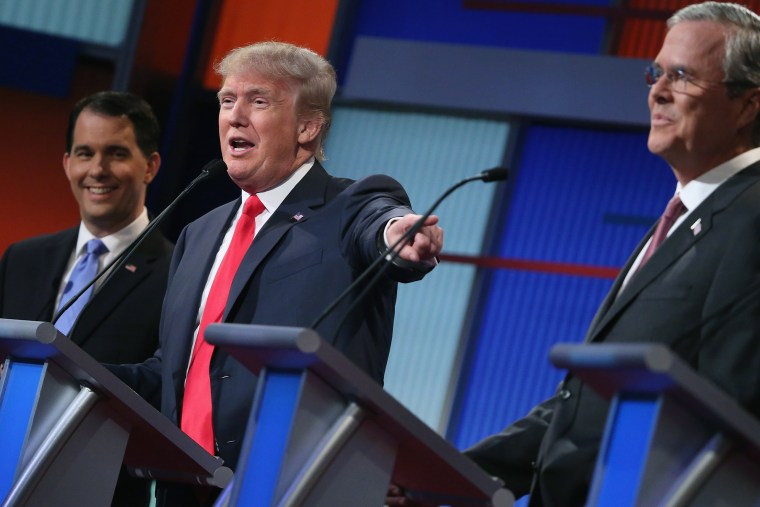By practically every metric, the attack on a U.S. Marine compound in Beirut was far more devastating -- it killed 241 American servicemen, which came just six months after militants had bombed the U.S. embassy in Beirut, killing 63 people, including 17 Americans. Six months after the attack, militants struck American officials in Beirut again, killing the CIA's station chief. And six months after that, terrorists bombed a U.S. government outpost in Beirut once more -- in the middle of Reagan's re-election campaign.
In recent years, the obvious question has largely gone unanswered: if Democrats didn't blame the deadly attacks in Beirut on President Reagan, why should Republicans blame President Obama for the four Americans killed in Benghazi?
Over the weekend, however, a new area of inquiry emerged. CNN's Jake Tapper asked Republican presidential hopeful Jeb Bush a question that hasn't come up much in recent years.
TAPPER: Obviously, al Qaeda was responsible for the terrorist attack of 9/11. BUSH: Yes. TAPPER: But how do you respond to critics who ask, if your brother and his administration bear no responsibility at all, at all, how do you then make the jump that President Obama and Secretary Clinton are responsible for what happened at Benghazi? BUSH: Well, I -- it's -- the question on then Benghazi, which is -- hopefully we'll now finally get the truth to, is, was that -- was the -- was the place secure? They had a responsibility, the Department of State, to have proper security.
Tapper carefully reminded the GOP candidate, "Well, that's kind of proving the point of the critics I was just asking about, because you don't want to have your brother bear responsibility for 9/11."
It wasn't a question Bush seemed well prepared for, and that's probably because the entire line of inquiry is quite new.
Indeed, much to Bush's apparent surprise, Donald Trump has apparently picked one of the most unexpected fights of the presidential campaign to date: a debate over George W. Bush's failures surrounding the attacks of Sept. 11, 2001.
It started in earnest on Friday, when Trump noted in a Bloomberg interview that it was on George W. Bush's watch that the Twin Towers fell. Jeb Bush called the comments "pathetic," adding, "We were attacked and my brother kept us safe" -- a sentence that seemed to contradict itself.
The back and forth continued through the weekend, including Jeb's comments to Tapper and Trump telling Fox News that he might have been able to prevent 9/11 through his "extremely, extremely tough" immigration policies.
More than 14 years after the 9/11 attacks, the Bush/Cheney administration's handling of the crisis is generally untouchable for much of the domestic political world. This is especially true in Republican politics, where George W. Bush's documented 9/11 missteps are not only ignored, his response to the terrorist attack is actually seen as a triumph.
The "Bush kept us safe" line, despite its conflict with the real world, is actually quite common in Republican circles.
And yet, Trump has no use for GOP orthodoxy and has no qualms about broaching a line that most Republicans go out of their way to avoid. For his part, Jeb Bush was not only caught off-guard trying to explain why Obama should be blamed for Benghazi but his brother shouldn't be blamed for 9/11, the Florida Republican also finds himself once again replacing his usual campaign message with a public defense of his brother's failed tenure.
As Ezra Klein put it yesterday, "Trump has a bully's instinct for finding someone else's true weaknesses. His continued crack that Bush is a 'low-energy' candidate is devastating precisely because it identifies a weakness not just in Bush's campaign style, but in the nature of his campaign. Now Trump has pulled Bush into an even more dangerous quagmire: his brother's presidency."
